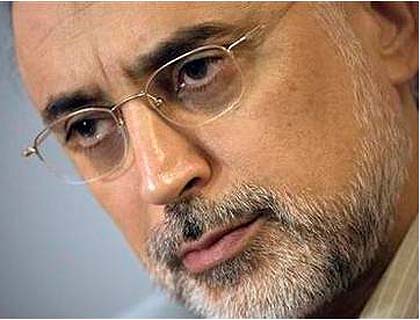DUBAI - - Iran's foreign minister said on Monday a way must be found to end the deadlock with major powers over the country's nuclear programme, an Iranian news agency reported, but he offered no new initiative on how to achieve this.
Ali Akbar Salehi's comments came ahead of an expected resumption of diplomacy, perhaps next month, aimed at preventing the decade-old nuclear dispute from degenerating into a Middle East war that could damage
Israel, widely believed to be the Middle East's only nuclear-armed power, has threatened military action to prevent its arch-enemy from acquiring nuclear weapons. Iran denies any such goal and says it would hit back hard if attacked.
"The two sides (Iran and world powers) have reached a conclusion that they must exit the current stalemate," Salehi was quoted as saying by the Iranian Students' News Agency.
The West suspects Iran is trying to develop the means to build atomic bombs under the cover of a declared civilian nuclear energy programme. The Islamic Republic says it is enriching uranium as fuel for civilian energy, not bombs.
Iran and the six powers - the United States, Russia, France, China, Britain and Germany - have expressed readiness to revive efforts to find a negotiated solution. But Salehi said he did not know when the next meeting would be held.
The powers, known as P5+1, said last week they hoped soon to agree with Iran on when and where to meet. There have been suggestions it could happen this month, though January now seems more likely, Western officials say.
In Washington, the State Department said Iran had been presented with a specific offer of a date and venue for the next talks but had yet to respond.
"We are continuing to maintain contacts with the Iranians. We did make an offer with regard to venue and timing for another round but we have yet to hear from the Iranians on this," State Department spokeswoman Victoria Nuland said.
"Really the ball is in the Iranians' court. If they want to come back to the table we are ready to do that, but we want to see them be serious," Nuland told a news briefing.
Analysts and diplomats believe there is a window of opportunity for a new diplomatic initiative with Iran after last month's re-election of U.S. President Barack Obama.
The powers want Iran to scale back its uranium enrichment programme and cooperate fully with U.N. nuclear inspectors.
The priority for Iran, a major oil producer, is for the West to lift punitive sanctions increasingly hurting its economy.
Three rounds of negotiations earlier this year - the last one in Moscow in June - failed to achieve a breakthrough.
The big powers have prepared an updated version of a package that was rejected by Tehran in the previous talks, Western diplomats say, without giving details.
Their immediate priority is for Iran to halt higher-grade enrichment that could relatively quickly be further processed to bomb-grade material, shut the Fordow underground plant where this work is carried out and ship out the stockpile.
SHUTTING FORDOW 'NOT ENOUGH'
Iran has hinted at flexibility regarding its enrichment to a fissile concentration of 20 percent, but it wants substantial sanctions easing in return, something the powers say would be premature before Tehran makes significant concessions.
Iran also wants recognition of what it says is its "right" to refine uranium, which can have both civilian and military purposes. "Iran demands its inalienable, legal and legitimate right and wants nothing more," Salehi said.
One Western official said it was too early to say whether the new diplomatic attempt may yield results. "We see that sanctions do have an economic impact on Iran and it is a matter for Iran to really take this offer seriously."
Iran's economic minister was quoted on Sunday as saying the country's oil revenues had been cut in half as a result of sanctions.
Another Western diplomat said the powers were increasingly concerned about Iran's expanded enrichment capacity at Fordow and wanted to address this issue in the new proposal. This could mean, he said, asking Iran to partially dismantle the facility.
"Shutting Fordow is not enough," the diplomat said, adding it would take longer to restart the facility if the enrichment installations had been taken apart.
The world powers hope to gain momentum in dealings with Iran by introducing "confidence-building measures" before approaching a final agreement at a later date, diplomats say.
They say the powers are likely to offer Iran some form of sanctions relief in return but any measures may be limited.
Salehi spoke a few days after the International Atomic Energy Agency and Iran both said progress was made in talks last Thursday on resuming a long-stalled IAEA investigation into suspected atomic bomb research in the country.
A senior Iranian legislator said on Monday that Iran would expect some sanctions relief in return for granting IAEA inspectors access to the disputed Parchin military complex.
The IAEA believes Iran has conducted explosives tests with possible nuclear applications at Parchin, a facility southeast of the Iranian capital, and has repeatedly asked for access.
"They must certainly give some incentive in return, and in my opinion a reasonable and equal incentive would be lifting the sanctions," said Alaeddin Boroujerdi, who chairs the national security and foreign policy committee in the Iranian parliament. (Reuters)

